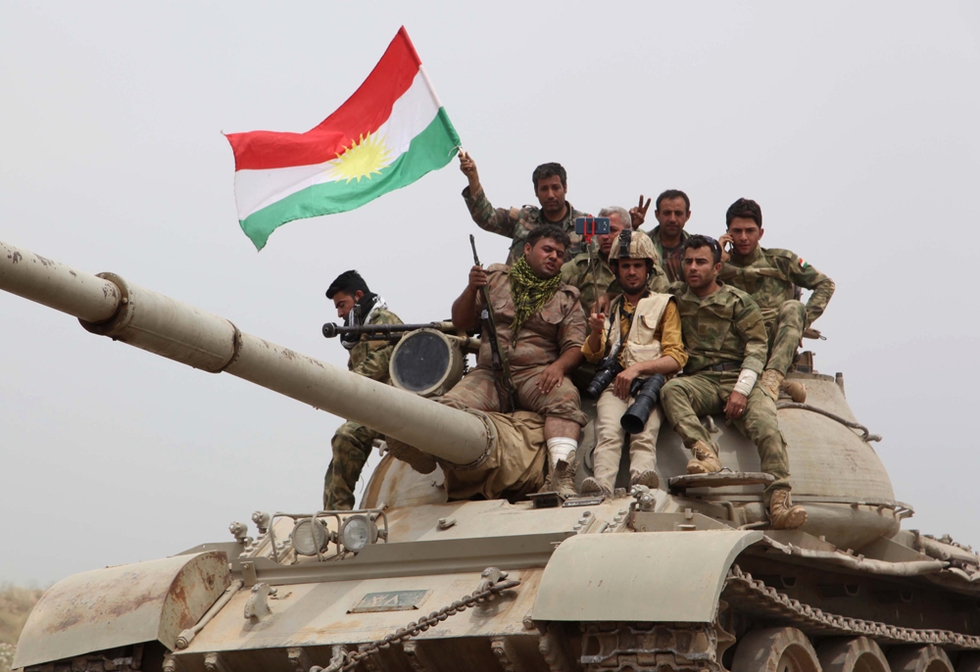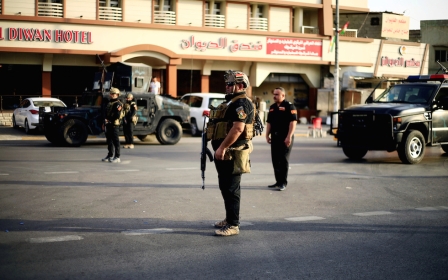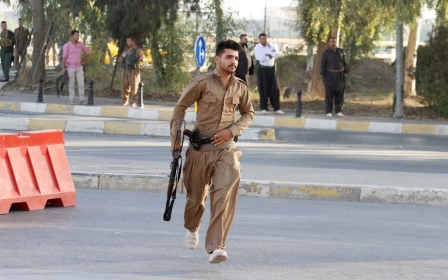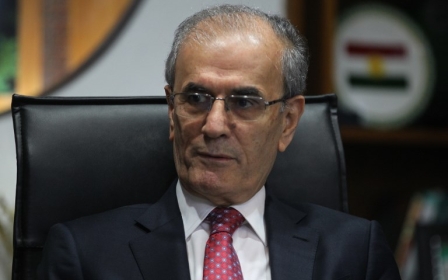Kurd fighters mobilise as Iraq denies launching Kirkuk operation

The Iraqi army denied that it launched an operation to retake Kurdish-held positions around the disputed oil city of Kirkuk on Friday, as Kurdish forces reacted to reports of a mobilisation by Iraqi military and paramilitary forces near the city.
AFP quoted an anonymous Iraqi general on Friday as saying that the military was preparing to capture Kirkuk back from the Kurdish Peshmerga forces.
Anyone disseminating news that this is against peshmerga is incorrect
- Captain Mustafa al-Hadad, Iraq army
"Iraqi armed forces are advancing to retake their military positions that were taken over during the events of June 2014," the general told AFP by telephone, asking not to be identified.
He said that federal troops had already taken one base west of Kirkuk on Friday morning after Peshmerga fighters withdrew during the night without a fight.
However, Brigadier General Yahya Rasool, spokesperson for Iraq's Joint Operation Command, told Middle East Eye that reports of a troop build-up were "not true".
A commander of the paramilitary Popular Mobilisation Units (PMUs) also told the al-Sura news site that reports of a military operation were false and said that Iraqi forces were simply clearing out remaining Islamic State forces around Hawija.
“Our operations are clearing North Hawija from IS," said Captain Mustafa al-Hadad. "Anyone disseminating news that this is against Peshmerga is incorrect."
Despite the denials, Kurdish Peshmerga commanders were set to meet on Friday to discuss preparing for an assault on the city, and 6,000 Peshmerga fighters are said to have been mobilised to the city since Thursday.
A video clip sent to Middle East Eye by a Kurdish government spokesperson, which cannot be independently verified, appeared to show PMU forces gathering in the village of Bashir, south of Kirkuk:
A senior Kurdish official said thousands of heavily armed fighters had been deployed to resist the alleged offensive "at any cost" and called for international intervention with the federal government in Baghdad to prevent the confrontation worsening.
The Iraqi army and the Kurdish Peshmerga have been key allies of the US-led coalition in its fight against the Islamic State group, and the threat of armed clashes between them poses a major challenge for Western governments.
Ethnically divided but historically Kurdish-majority Kirkuk is one of several regions that Peshmerga fighters took over from the Iraqi army in 2014 when IS fighters swept through much of northern and western Iraq.
But Baghdad is bitterly opposed to Kurdish ambitions to incorporate the oil-rich province in its autonomous region in the north and has voiced determination to take it back.
'Defend at any cost'
Hemim Hawrami, a senior adviser to the Kurdish president, Masoud Barzani, urged the international community to intervene and called on Iraq's prime minister, Haider al-Abadi, to "order PMF to pull back if he can or if they listen to him".
"No escalation from our side. Just defend and roll them back if they attack," he said.
The surge in tensions comes two weeks after Kurdish voters overwhelmingly backed independence in a non-binding referendum that the federal government condemned as illegal.
Polling was held in the three provinces that have long formed an autonomous Kurdish region as well as several other Kurdish-held areas, including Kirkuk.
Baghdad continues to reject decades-old Kurdish ambitions to incorporate the city and other historically Kurdish-majority areas in their autonomous region.
The Kurdistan Regional Security Council (KRSC) said that the Iraqi army and the PMUs had been deploying tanks and heavy artillery to Bashir and Taza Khurmatu.
"These forces are approximately three kilometres from Peshmerga frontline positions," it said.
"Intelligence shows intention to take over nearby oil fields, airport and military base," it added.
Kirkuk province is the location of northern Iraq's main oil fields and, even though far more crude is now pumped from the south, it is bitterly disputed between Baghdad and the Kurds.
US Defense Secretary Jim Mattis, meanwhile, said on Friday that Washington is working to reduce tensions between Iraqi federal and Kurdish forces, urging them to remain focused on the war against militants.
"We are trying to tone everything down and to figure out how we go forward without losing sight of the enemy, and at the same time recognizing that we have got to find a way to move forward," he told reporters.
"Everybody stay focused on defeating ISIS. We can't turn on each other right now. We don't want to go to a shooting situation," he added, using an alternative acronym for the Islamic State (IS) group.
New MEE newsletter: Jerusalem Dispatch
Sign up to get the latest insights and analysis on Israel-Palestine, alongside Turkey Unpacked and other MEE newsletters
Middle East Eye delivers independent and unrivalled coverage and analysis of the Middle East, North Africa and beyond. To learn more about republishing this content and the associated fees, please fill out this form. More about MEE can be found here.




